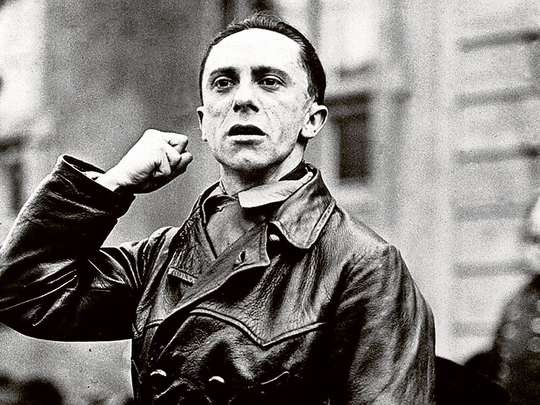
Goebbels: A Biography
By Peter Longerich, translated by Alan Bance, Jeremy Noakes and Lesley Sharpe, Random House, 992 pages, $40
The historical landscape is littered with the wreckage of regimes, many of them defeated after long and bloody struggles, but there is nothing in modern European history quite like the destructive fury with which Hitler’s Thousand-Year Reich came to an end.
Long after any hope of victory had been extinguished, the government’s supporters kept on fighting, killing not only their enemies, both real and imagined, but also many of their fellow countrymen whose commitment to the cause seemed to waver. And finally they began to kill themselves.
Among the scores of Germans who committed suicide in Nazi Germany’s final hours were Dr Joseph Goebbels, minister of propaganda and, since July 1944, “Reich Plenipotentiary for Total War”, and his wife, Magda. Before ending their own lives, they murdered their six children, five girls and a boy; the oldest, Helga, was 12, the youngest, Heide, 4.
Goebbels’s path to his death in the bunker below the ruins of Hitler’s Chancellery began in 1924, when he became a founding member of a chapter of the National Socialist Workers Party in his hometown, Rheydt, a small city in the Rhineland, not far from Dusseldorf. That year Goebbels turned 27, without past accomplishments or future prospects: unmarried, unemployed and still living at home, he was the author of an unpublished doctoral dissertation on a deservedly obscure German writer and a few unfinished works of autobiographical fiction.
The National Socialists, a small, isolated and deeply divided group on the radical fringe of German right-wing politics, turned out to be the perfect instrument through which Goebbels could achieve the historical destiny that, despite all evidence to the contrary, he firmly believed was to be his.
Among this crowd of misfits and fanatics, Goebbels’s talents were impressive. Energetic, relatively efficient, unencumbered by an excess of political ideas but remarkably adept at expressing the movement’s hatreds and frustrations, he quickly acquired ever greater responsibility.
Goebbels’s big break came in 1926, when he was sent to take over the faltering Nazi operation in Berlin. While his record as Gauleiter in the German capital was by no means as triumphant as he often claimed, he was able to create an effective political organisation, manage deep internal divisions and attract a small but committed following.
Thanks in part to his managerial skills and oratorical gifts, the party survived the Weimar Republic’s brief period of stability and was in a position to take advantage of the political and social turmoil unleashed by the Great Depression.
What exactly did Goebbels believe in? Peter Longerich, the author of several important books on the history of Nazi Germany and the founder of the Holocaust Research Centre at the University of London, rejects the conventional portrait of him as a cynical opportunist. But he admits that “even after a careful perusal of his extensive writings, the reader remains unclear as to what Joseph Goebbels’s political agenda was and what political maxims he was advocating”.
On only two matters did Goebbels’s commitment remain consistent and passionate. One was the so-called “Jewish question”. From the start of his political career until the very end, Goebbels viewed Jews, both at home and abroad, as the source of Germany’s misfortunes. He supported without hesitation the regime’s increasingly radical racial policies as they evolved from persecution to exclusion to mass murder. “A judgment is being carried out on the Jews that is barbaric but thoroughly deserved,” he wrote in March 1942. “There must be no sentimentality about these matters.”
The second, no less powerful and persistent of Goebbels’s political commitments was his loyalty to Hitler. He was a narcissist, Longerich argues, who needed to be admired by everyone he met, but he was especially and obsessively addicted to Hitler’s admiration, which he would do anything to retain. He was the only one of Hitler’s closest associates who remained with him until the end, finally affirming his fealty with his own, and his family’s, death.
From Goebbels’s endlessly elaborate descriptions of his meetings with the Führer, we can see — as Goebbels himself often could not — just how skilfully Hitler manipulated him, deftly deploying his talents, exploiting his weaknesses, nurturing his loyalty by feeding but never fully satisfying his insatiable appetite for approval.
Hitler saw to it that, like everyone in his inner circle, Goebbels had to share power with others: although formally in charge of propaganda, he was never given complete control over the party’s publishing business or its press agency and was constantly frustrated by the Foreign Office’s attempts to influence opinion overseas. Hitler’s own authority was based on his role as the final arbiter of the disputes that constantly erupted among his ambitious and aggressive courtiers.
Goebbels’s great advantage in the contentious world of Nazi politics was his personal connection to the Führer. Longerich describes in considerable detail Hitler’s close relationship with the entire Goebbels family, and especially with Magda, to whom he seems to have felt a powerful emotional attachment.
In 1938, when Magda complained about her husband’s affair with the Czech actress Lida Baarova, Hitler intervened and insisted on a reconciliation. Faced with the choice between the charms of the lovely Baarova and his loyalty to the Führer, Goebbels does not seem to have hesitated a minute. (“And now,” he confided to his diary, “a new life is beginning. A hard, tough life, dedicated to nothing but duty. My youth is over.”) Despite Longerich’s best efforts, however, the psychodynamics of this odd arrangement remain obscure. As is so often the case in histories of Nazi Germany, the Hitler of this account seems at once centrally important and ultimately elusive.
Longerich offers a vast amount of information about Goebbels’s place in the public and private world of the Nazi elite, his work as the regime’s chief propagandist and his efforts to rally the nation amid wartime disasters and in the face of impending defeat.
Although he was always at the centre of events, Goebbels was never as important as he wanted to be. Again and again, his power was limited by the fact that while Hitler counted on his skill as a propagandist, he had no confidence in his political judgment or tactical instincts.
When we read Goebbels’s unfailingly banal comments on people and events, we can understand why he was rarely consulted about important decisions. Of Mussolini, for example, we learn from his diary: “He’s short. But a huge head. ... Is like a friend to me right away. ‘Il dottore.’ We hit it off immediately.”
“Goebbels: A Biography”, in a fluent translation of the German version published in 2010, is likely to remain the definitive account of the man’s life. No other scholar has so successfully mastered the enormous mass of material he left behind. One special feature of this biography is Longerich’s skill in analysing the diary that Goebbels kept virtually every day from 1923 until almost three weeks before his death in 1945. A full copy was discovered in Moscow in 1992 and is now available in an edition that runs to 32 volumes.
One must admire the dedication required to separate fact from fantasy in this extraordinarily rich but also extraordinarily problematic source. How wearing it must have been to spend so much time with someone as relentlessly self-absorbed as Joseph Goebbels. As Longerich so thoroughly demonstrates, the world was a mirror for Goebbels, often held so close to his face that it could reflect nothing but himself.
–New York Times News Service
James J. Sheehan is an emeritus professor of history at Stanford University.









